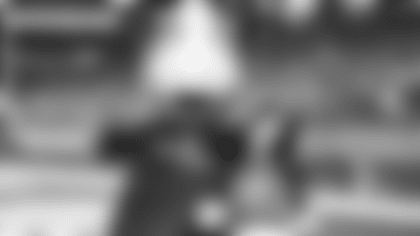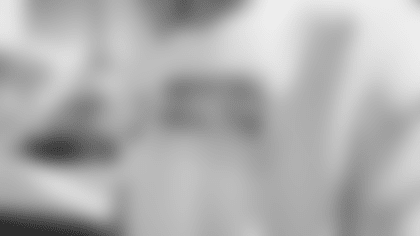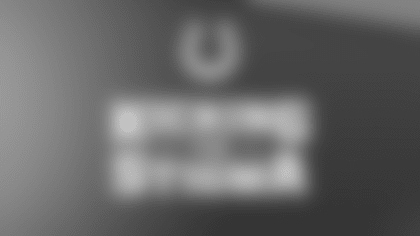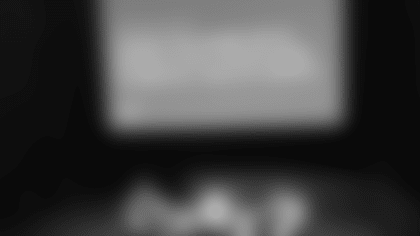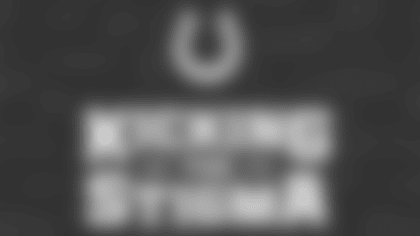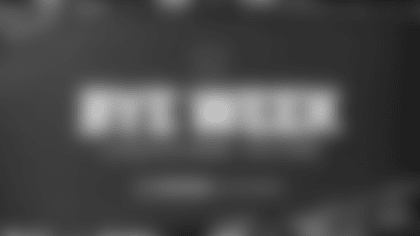As the Irsay family works to expand and improve research, treatment and awareness of mental health disorders through Kicking The Stigma, they're also focusing on efforts to tend to the mental health and well-being of club staff and players.
Club staff, of course, live in Indiana – a state which has only 36 percent of the mental health providers required to meet its population's needs, according to KFF.org. Earlier this year, the Colts launched a partnership with Ulliance to provide free, confidential mental health services – counseling, life enhancement coaching, crisis intervention, community resources, work-life materials and a well-being portal – to team employees and their families.
"It really runs the gamut in terms of need and what someone might be struggling with," Colts Vice Chair/Co-Owner Kalen Jackson. "And it's something we found to be really important to invest in for our employees. We're a family-run company. We always have been and really feel that our employees are like family, and we felt we weren't doing enough. This is another step in the right direction."
Through the program, staff can contact a crisis hotline available 24/7/365, and can access in-person or virtual counseling and coaching. Employees do not need to worry if mental health services are covered by insurance, as these are complimentary, and if further counseling is required beyond sessions provided by Ulliance, those using the EAP can be directed to in-network services.
"The biggest step is admitting you need help and coming to terms with the fact that you need some sort of help. That's a huge step," Jackson said. "But then as soon as you make that step, you're faced with this huge challenge of — where do I go? How do I know it's the best evidence-based practice I can find, how do I know I'm going to the right person for what I need? A lot of people may not even know why they're feeling the way they're feeling.
"That's a huge thing is then to have the stress of trying to figure out where to go and how to go, and is it covered with insurance, is it not, and that's a big part of what we're trying to battle with our donations is having more resources and equitable access to those resources and really looking at the areas of need. It could be as simple as there's transportation barriers of even getting to the place that you would need to get help.
"I think this EAP program is really meant to be kind of a sigh of relief — at least I have somewhere to start because it's so overwhelming."
Jackson and the Colts are working on more internal initiatives to support employee mental health in addition to the Ulliance Employee Assistance Program. Last year, the Irsay family closed the Colts' office for the Thursday and Friday of the team's bye week, offering employees an extended break to address their mental health during the season.
The Colts have also been on the forefront of supporting players' mental health, too. The team hired clinician Elizabeth White in 2015, four years before the NFL and NFLPA began requiring teams to retain a licensed clinician on staff. Jackson has seen how players accepting and prioritizing those sessions has become part of the fabric of the team, too.
"We felt very proud that we were ahead of that curve and noticing that was a need," Jackson said. "We've always been very proud to have her on board.
"... When someone is exposed to (therapy) for the first time, it helps create this culture of understanding of what it really is and how they see other players benefitting from it and being totally comfortable talking to her in the lunchroom and saying, I'll see you in your office later," Jackson said. "It's become part of the culture. And that's so important, it's exactly what we want is for everyone — all our players to feel that it's okay to have those vulnerable moments, it's okay to lean on somebody else and realizing what kind of community you can get from that. And I think it probably makes them all connect that much more with each other. She's been such a great asset."
Jackson had an opportunity to present the work the Colts are doing in the mental health space to other teams during the NFL's Annual League Meeting in Palm Beach, Fla. earlier this spring. She said a number of representatives from teams around the league expressed their appreciation for the internal and external work the Colts are doing, and Jackson said she hopes the Colts can be an example for other NFL clubs to follow when it comes to mental health.
"It's not just about an EAP program and people who are in crisis," Jackson said. "It's about balance and the total mental well-being of our employees and are we doing enough to help them get to where they need to be, to be healthy mentally and age happy in our community at the Colts. And we really put that on our shoulders and know that's a big responsibility of ours and we take it seriously."



